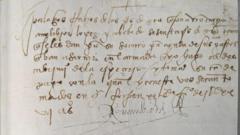The FBI recently returned a 1527 document signed by conquistador Hernán Cortés to Mexico, following its disappearance from the national archives. This act of repatriation highlights ongoing international efforts to address historical injustices related to cultural heritage and the responsibilities of nations regarding stolen artifacts.
FBI Returns Historic Cortés Manuscript to Mexico Amid Ongoing Artifact Repatriation Efforts

FBI Returns Historic Cortés Manuscript to Mexico Amid Ongoing Artifact Repatriation Efforts
A 500-year-old document authored by Hernán Cortés, detailing expeditions in what is now Mexico, has been repatriated by the FBI, reflecting the complexities of historical artifact ownership and cross-border cooperation.
The FBI has announced the successful repatriation of a significant historical document to Mexico, specifically a 500-year-old manuscript page authored by the infamous conquistador Hernán Cortés. The document, written in 1527, outlines logistical expenses related to Cortés's expeditions, making it one of 15 original pages speculated to have been illicitly taken from Mexico's national archives during the years between 1985 and 1993. This timeline highlights the complexity surrounding the stewardship of cultural artifacts.
Cortés, recognized for his critical role in dismantling the Aztec Empire and initiating Spanish colonization in the Americas, left a substantial impact on history, and this document provides insight into his plans for exploration. The manuscript, believed to have been composed after Cortés's appointment as the governor of New Spain by the Spanish crown, has been missing since microfilming efforts at Mexico’s national archives in the early 1990s revealed its absence.
The recovered page featured a distinct wax inscription made in the mid-1980s, indicating its theft likely occurred before the second cataloguing phase. In response to the disappearance, the Mexican government enlisted the help of the FBI's dedicated art crime unit, which confirmed the document's location in the U.S. through open-source investigations. However, the specific conditions of the document's recovery and its previous ownership remain undisclosed.
Despite the successful recovery, the FBI stated that no charges would be pressed regarding the theft, attributed to the document having changed ownership multiple times. Jessica Dittmer, a special agent in the FBI's art crime team, emphasized the document’s significance in understanding Mexico's historical narrative, categorizing it as a protected cultural asset.
This restoration comes at a time marked by political sensitivities between Mexico and the United States, particularly regarding tariffs and immigration policies. Nevertheless, the FBI continues to stress the United States' obligation to combat the trafficking of antiquities, reinforcing the need for responsible stewardship of cultural properties. The agency has made it clear it will continue efforts to locate and return the remaining missing pages from this historic collection, underscoring a commitment to rectifying past wrongs in the realm of artifact ownership.
The repatriation of this manuscript follows a broader trend in international artifact restitution, as seen with the recent return of looted treasures by various nations, underscoring the pressing dialogue on colonial legacies and their present-day implications.

















